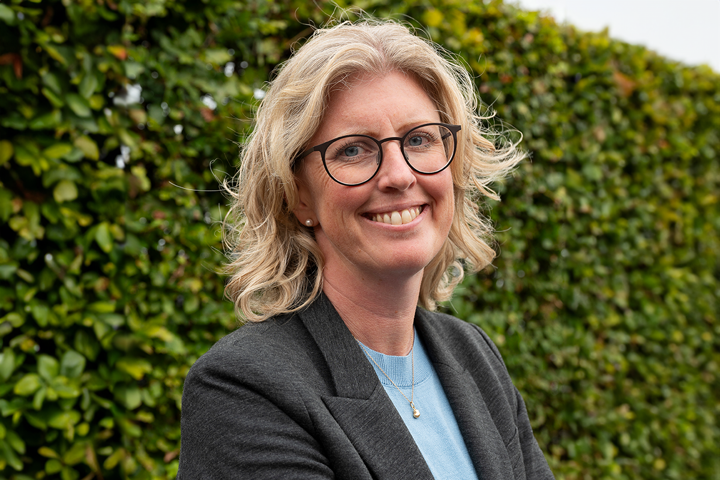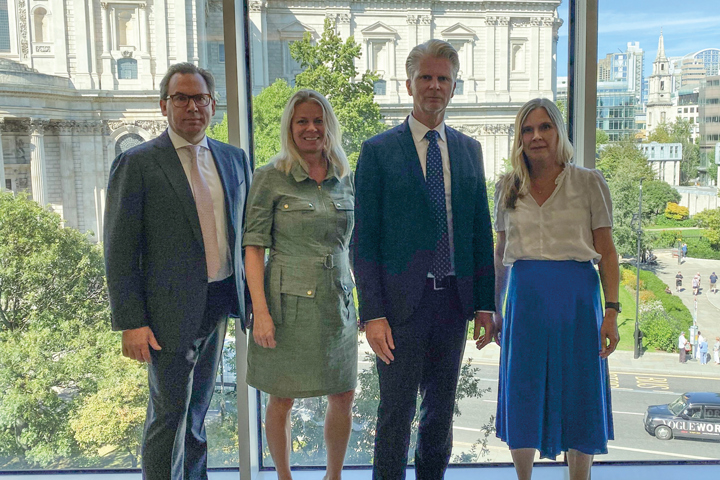
The ‘new food’ revolution
9 January 2024
With a constantly growing population and a food system standing for approximately one third of the global greenhouse gas emissions, SCC patron and food innovation pioneer Tetra Pak faces the future with their ‘new food’ initiative – focusing on revolutionary methods to promote more sustainable food production. “Our purpose is to commit to make food safe and available everywhere,” says Ida Svensson, Transformation Manager New Food, Tetra Pak.
Whether you’re pouring your juice or getting the chickpeas out for your curry – Tetra Pak’s logo is widely recognised and can be found on packages in refrigerators and cupboards all across the globe. With operations in 160 countries, the company is a big player in the food system globally. Not quite as visible as the packages, however, are the divisions within the company focusing on processes and services in the food production chain. Ida explains: “What you don’t see is how the milk, juice, or cheese that’s inside the package is produced. At Tetra Pak we also have a processing division operating globally. So, if you eat an ice cream for instance, no matter where you are in the world, there’s a 70% chance that it has passed through a freezer produced by Tetra Pak.”
Support from idea to shelf
“It’s a long way from idea to the consumers’ shelf, but we support all the way,” says Ida.
Whether it be a startup with an idea of a new plant-based product, or an established company wanting to expand their range of yoghurts, Tetra Pak has product development centres spread around the globe in which they help their clients optimise the recipe for their specific product. “We have different development centres depending on the products. If you’re testing ice cream, we would bring you to Denmark, and if it’s tea, you might end up going to Singapore.”
Challenges in the current food system
Regarding the existing food system, Ida points out a number of challenges to overcome. Not only does the food system stand for approximately one third of the greenhouse gas emissions, but there is also an increasing number of diseases connected to what we eat. On top of this, one third of the population is overweight and more than 800 million people are chronically undernourished.
“The food system as it is now, is not sustainable. And if we look towards the future with the growing population, which the World Health Organisation expects to be more than 10 billion people, we need 56% more food to feed us all. We are already using approximately 50% of the land we can use for agriculture, and we don’t want to increase the size of that. It’s clear that we need more food, but we can’t produce it in a way that puts more stress on the system than it already does,” says Ida.
The New Food initiative
As the need for change becomes more and more prominent, Tetra Pak has started looking into how food can be produced in a more sustainable way. With an eye on the future, the company has now embarked on a ‘new food initiative’ – featuring advancing technologies such as precision, and biomass fermentation as methods of food production. “Fermentation in itself is nothing new, it is a classic technique that’s been used for thousands of years. But once you combine it with modern techniques like the bioreactors used in pharma, it is possible to help produce food in a sustainable way,” Ida explains.
“In precision fermentation, you can programme a microorganism to produce a specific type of protein or fat, which can then be used in a product. When it comes to biomass fermentation, it means that you can grow for example fungi in a bioreactor instead of out in the forest.”
Today, microorganisms in a bioreactor are often fed with just sugar – meaning that as long there is energy, food can be grown anywhere. In the future, Ida says, it is also realistic that instead of feeding the microorganisms with sugar we’d be able to feed them with CO2. “So if you play with this thought of having a bioreactor in the desert, run by solar energy and fed with CO2 – you have cut a lot of different steps. We need more pieces in the puzzle to solve the challenges we have, but we do believe that these microorganisms are an important piece to help us along the way.”
Types of new food
In a near future, Ida believes that fermented foods will become more and more present in our everyday lives. Once the EU legislations adapts, she believes we will see an increased amount of ‘new food’ products in this part of the world – which can already be found in for example the US and Singapore. This includes new vegetarian products, as well as hybrid products where parts of the meat are replaced with fermented ingredients.
“It might sound a bit strange. People have asked me ‘is this gene modified food?’ and the answer is no. In fact, I’m pretty sure you’ve already eaten it. For example the rennet, used in making cheese, is produced with precision fermentation,” says Ida.
Looking at the next steps beyond the establishment of fermented products, Ida envisions cultivated meats and insects becoming more and more common in the future.
Innovation and collaboration
“The interest for the new food sector is huge globally, and in order to advance fast and in the best possible way for our consumers we need to collaborate. It’s not about removing everything we have today. We still want to protect the dairies and the farmers, and add new things to the market.”
In order to advance innovations, Ida emphasises the importance of partnerships. For example, Tetra Pak regularly collaborates with universities and recently launched the initiative “Biotech Heights,” with Lund University, focusing on biotechnology advancements. Looking ahead, Tetra Pak aims to continue connecting cross-disciplinary players, as it facilitates progress in the sustainable food production. “We want to continue to fulfil our purpose to make sure that people get food. And as a company, we feel that we need to take our responsibility. We have a global network, long history in the food industry, and the experts and resources to investigate. This is nothing that can be solved overnight – it takes muscles, network, and resources to do it.”



Join our mailing list
and keep up-to-date with the Chamber's news and events.
Read our Privacy Policy here